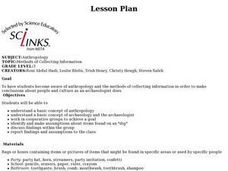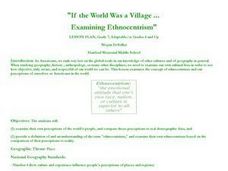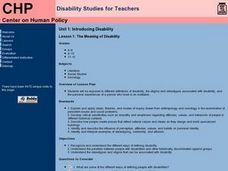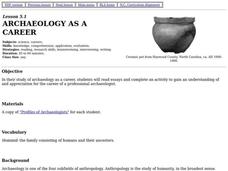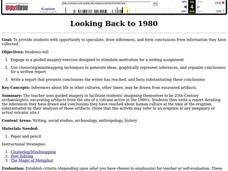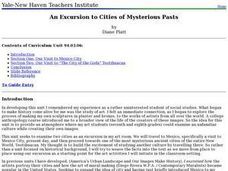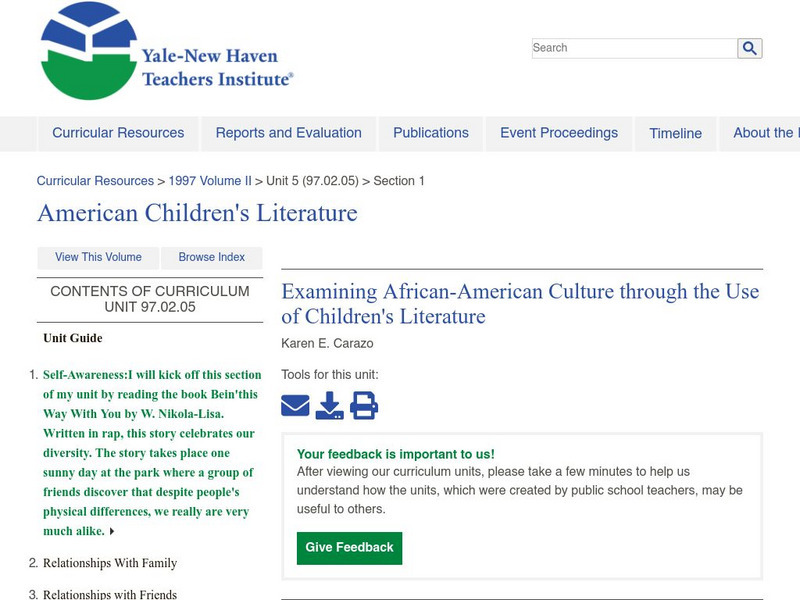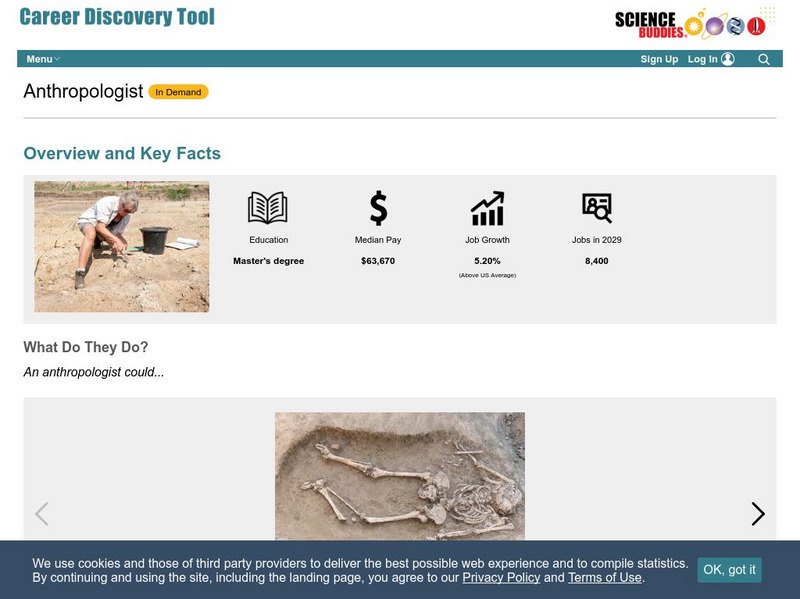Curated OER
Methods of Collecting Information
Third graders examine a bag or box of soil containing items that they dig for. Their task is to become detectives to make conclusions about the area from which the items came as real archaeologists do.
Curated OER
American Prehistory: 8000 Years of Forest Management
Young scholars discuss the first people to live in North America and the types of evidence we have of their existence. They complete a set of worksheets and explore their answer in group discussions.
Curated OER
If the World Was a Village...Examining Ethnocentrism
Seventh graders examine their own perceptions of world's people, compare those perceptions to real demographic data, provide definition and understanding of term "ethnocentrism," and examine their own ethnocentrism based on comparison of...
Curated OER
We Arrived 10,000 Years Ago...
Students explain ways that humans migrated from Asia and settle in the Americas. In this investigative lesson plan students participate in a brief archaeological demonstration and review what they learned.
Curated OER
Mountain Myths
Learners become familiar with Native American myths and legends created to explain volcanic activity. They apply the clustering, writing process and peer-editing techniques to the writing of an original myth about Mount St. Helens
Curated OER
The Meaning of Disability
Students discover the different types of disabilities. They examine the stereotypes and stigmas associated with them and hear from a person who lived in an institution.
Curated OER
Hieroglyphics: It's Not Greek To Me! (It's Egyptian)
Young scholars identify different hieroglyphic characters. They spell their name and write a sentence using them. They use online hieroglyphic translators as well.
Curated OER
Amazon Adventure: a Case Study in Medical Technology And Bioethics
Pupils test problem-solving skills, the ability to see connections, and the ability to draw conclusions and inferences from information provided in a case study. Given a case study, they formulate a procedure and draw conclusions.
Curated OER
Amazon Adventure: A Case Study in Medical Technology and Bioethics
Students explore a case study. They use problem solving skills to determine initial procedures or experiments necessary slow disease and develop a drug. Students examine FDA drug approval procedures. They consider environmental and...
Curated OER
The Sociological Point of View
In this sociology and society worksheet, learners respond to 4 short answer questions and match 15 sociology terms on the left to the description on the right.
Curated OER
Harlem Renaissance Research Project
Students complete a group research project on the Harlem Renaissance. In this Harlem lesson, students pick from a list of topics all related to the Harlem renaissance. They create a PowerPoint presentation, topic outline, and...
Curated OER
Indians in Georgia: How Do We Know What We Know?
Students discover archaeology by investigating the history of Native Americans in Georgia. In this U.S. history instructional activity, students participate in a mock archaeological excavation in their classroom by recovering...
Curated OER
Native Lands: Indians in Georgia, How Do We Know What We Know?
Students examine Native American oral traditions. In this Georgia history lesson, students discuss Native American oral traditions and research stories of migration. Students create their own oral history projects that feature their...
Curated OER
Archaeology as a Career
Fourth graders read about archaeology as a career. They develop a list of questions they would like to ask an archaeologist and then actually interview an archaeologist on the future of archaeology as a career.
Curated OER
Looking Back to 1980
Students use clustering/mind mapping techniques to generate ideas, graphically represent inferences, organize their conclusions and write a report that presents conclusions the writer has reached, and facts substantiating those conclusions.
Curated OER
Out of Sight, Out of Mind
Students examine conditions at state mental hospitals after World War II. They examine the treatment of patients and how to evaluate the credibility of sources. They write a short essay to complete the lesson.
Curated OER
An Excursion to Cities of Mysterious Pasts
Students use the encyclopedia sources on the computer or in the library to research the historic sites and history of Mexico City. They make notes of what they find to be the most interesting for their visit. They make a large map of...
Curated OER
Polymer Clay Millefiori Cane Beads
Students explore how to make millefiori cane beads. They use clay and beads to form the unique art.
Curated OER
Predicting the Past
Students study how archaeologists record the past. They discuss archaeology and artifacts. They view a list of artifacts discovered by Marquette at the Illinois Village and answer questions regarding them. They complete a test about...
Library of Congress
Loc: Human Nature and the Power of Culture
An exhibition from the Library of Congress about cultural anthropologist Margaret Mead with interesting insights on how she used her anthropological skills to explore the complexities of living in a diverse world.
Yale University
Examining African American Culture Through the Use of Children's Literature
This curriculum unit is designed for third grade students to address the issue of diversity during many different core areas via the use of African-American children's literature. The unit incorporates a variety of children's books, both...
Read Works
Read Works: What's the Big Idea About Anthropology?: Studying Cultures
[Free Registration/Login Required] Intended to support elementary students' reading comprehension, the meaning of the term "anthropology" is explained in this informational text. Graphic features are provided in this text.
Other
Buzzle.com: Historyplex: Examples That Simplify Meaning of Cultural Determinism
Explains what is meant by cultural determinism and the role anthropologist Franz Boas played in developing the concept, and provides examples of culture influencing human behavior.
Science Buddies
Science Buddies: Career Profile: Anthropologist
Does examining all aspects of human life appeal to you? Would you like to explore the origins of man, of language, of culture? This Science Buddies site gives a good overview of what is involved in the career of anthropologist. Find out...


